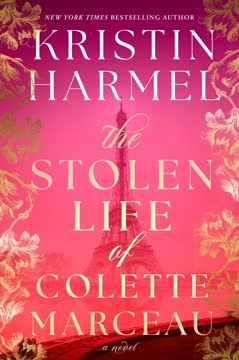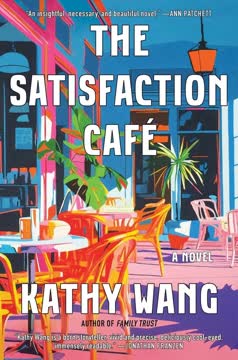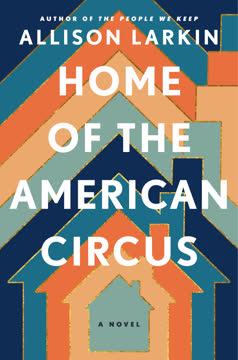Plot Summary
Self-Portrait in the Basement
Jess Baratta, newly divorced and living in her parents' basement in Lake Como, New Jersey, is stuck in a rut. She's the family's go-to caretaker, always putting others first, and now feels invisible and unfulfilled. Her therapist, Dr. Sharon, asks her to draw a self-portrait, which only highlights her unhappiness. Jess dreams of Italy, a place she's never visited but idealizes as a land of beauty and possibility. Her family, especially her mother, wants her to reconcile with her ex-husband, Bobby, but Jess is determined to find her own happiness—even if she doesn't know what that looks like yet.
Family Business, Family Burdens
Jess works for her Uncle Louie at Capodimonte Marble and Stone, the family business. The Capodimontes and Barattas are a tight-knit Italian American clan, their lives intertwined by tradition, food, and shared history. Uncle Louie is a charismatic, old-school Italian American, and he wants Jess to take over the business someday. He proposes a trip to Italy to see the marble quarries, a dream Jess has always harbored but never dared pursue. The family's expectations, secrets, and the weight of tradition both support and suffocate her.
Sunday Dinner, Secret Dreams
Sunday dinner is a sacred ritual, filled with food, laughter, and subtle power struggles. Jess's role as the unmarried, childless daughter means she's expected to serve and sacrifice. She secretly plans to move out and start a new life, but fears her family's reaction. The dinner table becomes a battleground for dreams and disappointments, with Jess's desire for independence clashing with her mother's need for control and her family's resistance to change.
Uncle Louie's Legacy
Uncle Louie, Jess's mentor and champion, suffers a heart attack and dies, leaving her grief-stricken and adrift. He bequeaths her the family business, but also a tangle of financial secrets—an off-the-books operation called the Elegant Gangster, with questionable tax practices and offshore accounts. The FBI comes knocking, and Jess is left to untangle the mess while mourning the only person who truly believed in her.
The Art of Escape
With Louie's encouragement (and a plane ticket he left her), Jess finally travels to Italy. She settles in Carrara, the marble capital, and is awed by the beauty, history, and the sense of belonging she feels among the mountains and piazzas. She rents a small apartment, befriends Conor, an Irish-Italian marble exporter, and meets Angelo, a talented but emotionally guarded gilder. Italy is both a literal and metaphorical fresh start, but Jess's old anxieties and family ties follow her.
Therapy, Truth, and Tears
Jess continues therapy online, cycling through a parade of therapists who each nudge her toward self-acceptance and assertiveness. She confronts painful family secrets: her parents used her college fund to pay for her brother's law school, and her mother's overprotectiveness stems from Jess's premature birth and early health struggles. Jess learns that her role as the "maiden aunt" was never her choice, and that true change means claiming her own desires, not just serving others.
Marble Mountains, Italian Light
Jess finds purpose in drafting marble installations and learning the craft of gilding from Angelo. She's drawn to the physicality and permanence of marble, seeing in it a metaphor for her own search for solidity and self-worth. The Italian landscape, with its ancient quarries and luminous light, inspires her to imagine a life built on her own terms. She also discovers that her Uncle Louie may have fathered a son in Italy decades ago, adding another layer to her family's complex legacy.
New Beginnings in Carrara
Living alone for the first time, Jess relishes her independence and the anonymity of being a stranger in a new place. She adopts a stray kitten, Smokey, and forms a circle of friends that includes Conor, Farah (a trans woman and marble engineer), and eventually, Angelo. She's evicted for keeping a pet, but stands her ground and negotiates to stay. Italy teaches her to balance tradition with self-assertion, and to find joy in small, daily rituals.
Gilded Connections
Jess's relationship with Angelo deepens, but both are wary—he's entangled with another woman, and Jess is still processing her divorce and family baggage. They share a passion for art and craft, but struggle to communicate their feelings. Meanwhile, Jess's ex-husband Bobby reappears, seeking closure and perhaps reconciliation. Jess realizes that love, like marble, requires both strength and vulnerability, and that she must let go of the past to embrace the future.
The Big Secret
Jess uncovers the truth about Uncle Louie's Italian son, Mauro, and must decide whether to reveal it to her family. She also confronts her parents about the sacrifices and betrayals that shaped her life, leading to painful but necessary conversations about money, gender, and expectations. The family's web of secrets, resentments, and unspoken love is laid bare, forcing everyone to reckon with the cost of loyalty and the possibility of forgiveness.
Love, Loss, and Letting Go
Jess returns to New Jersey for Aunt Lil's funeral, where she's reunited with her family, old friends, and the ghosts of her past. She learns that Bobby is now dating her best friend Lisa, and that her family is finally ready to acknowledge her needs and dreams. Jess forgives her parents, lets go of her anger, and accepts that happiness is not about pleasing others, but about building a life that feels true.
Coming Home Changed
Jess's journey comes full circle as she balances her American and Italian identities, her longing for family and her need for independence. She decides to return to Italy, where she buys and renovates her grandmother's old farmhouse in Carrara, turning it into a home and a symbol of her reclaimed agency. Her family visits, and she welcomes both blood relatives and chosen family into her new life.
The Elegant Gangster Unveiled
Jess works with the FBI to resolve the legal and financial fallout from Uncle Louie's secret business. She chooses honesty over profit, refusing to wear a wire or pursue the offshore money, and instead clears her name and the family's reputation. The experience teaches her that true legacy is not about money, but about character, courage, and the willingness to do what's right.
Forgiveness and Fresh Starts
Jess's family, including her newly discovered cousin Mauro, comes together in New Jersey for a funeral and a celebration of life. Old wounds are acknowledged, apologies are made, and new bonds are formed. Jess and Angelo, now free of old entanglements, admit their feelings for each other and look toward a shared future. Jess's mother finally asks if she's happy, and Jess can answer honestly: she is.
Building a Life Anew
Jess settles in Carrara, designing and renovating her own home, starting an architecture firm, and collaborating with friends old and new. She finds joy in work, love in partnership, and meaning in community. The lessons of her journey—self-acceptance, resilience, and the courage to claim her own story—become the foundation of her new life.
Family, Found and Chosen
Jess's family visits her in Italy, and she welcomes them into her new home, blending tradition with innovation, past with present. She honors her ancestors, forgives old hurts, and celebrates the family she's built—both the one she was born into and the one she's chosen. The view from Lake Como, whether in New Jersey or Italy, is now her own.
The View from Lake Como
Jess reflects on her journey in a letter to her therapists, expressing gratitude for the lessons learned and the life she's created. She's found happiness not by escaping her past, but by understanding and transforming it. The view from Lake Como—of family, love, loss, and self-discovery—is now clear, beautiful, and entirely hers.
Characters
Jess Baratta
Jess is the protagonist, a thirty-something Italian American woman whose life has been defined by service to her family and the expectations of her community. Newly divorced and living in her parents' basement, she struggles with anxiety, self-doubt, and the weight of tradition. Through therapy, travel, and the challenges of inheriting a complicated family business, Jess gradually learns to assert her needs, claim her dreams, and build a life on her own terms. Her journey is one of self-discovery, resilience, and the courage to embrace both her roots and her individuality.
Uncle Louie Capodimonte
Louie is Jess's beloved uncle, boss, and champion. He embodies the best and worst of Italian American tradition: generous, funny, and loyal, but also secretive and prone to cutting corners. His sudden death leaves Jess both a legacy and a mess—she inherits the family business, but also the Elegant Gangster, an off-the-books operation with legal and ethical complications. Louie's faith in Jess is the catalyst for her transformation, and his memory guides her as she navigates grief, responsibility, and the search for meaning.
Philomena "Philly" Baratta
Jess's mother is a force of nature—opinionated, anxious, and fiercely devoted to her family. Her overprotectiveness stems from Jess's premature birth and early health struggles, but it manifests as control and criticism. Philly's own disappointments and sacrifices shape her expectations for her children, especially her daughters. Over the course of the novel, she is forced to confront her own limitations, apologize for past hurts, and finally ask Jess the most important question: Are you happy?
Bobby Bilancia
Bobby is Jess's childhood sweetheart and former husband, a good-hearted but conventional man who represents the safety and limitations of her old life. Their marriage ends not in betrayal, but in the slow realization that Jess needs more than he can offer. Bobby's journey mirrors Jess's: he, too, must let go, forgive, and move on—eventually finding happiness with Jess's best friend, Lisa. His presence in Jess's story is a reminder that love can endure even after romance ends.
Angelo Strazza
Angelo is a gilder and marble craftsman in Carrara, Italy. He is emotionally reserved, shaped by family expectations and past disappointments, but is drawn to Jess's warmth, humor, and independence. Their relationship is slow to develop, complicated by misunderstandings and old entanglements, but ultimately becomes a partnership of equals. Angelo represents the possibility of new love built on mutual respect, shared passion, and the willingness to grow.
Aunt Lil Capodimonte
Lil is Uncle Louie's wife and Jess's godmother, a childless woman who becomes a second mother to Jess and her siblings. She is gracious, stylish, and supportive, offering Jess a refuge from family drama and a model of feminine strength. Her death is a turning point for Jess, prompting her to return home, reconcile with her family, and honor the women who shaped her.
Conor Kerrigan
Conor is a marble exporter and Jess's first friend in Italy. He helps her navigate the business, introduces her to key players, and provides emotional support. Conor's own story—balancing heritage, ambition, and love—parallels Jess's, and their friendship is a model of cross-cultural understanding and chosen family.
Farah Adeel
Farah is a Pakistani-British marble engineer and lecturer in Carrara. Her journey of gender transition and self-acceptance offers Jess a powerful example of courage and authenticity. Farah's friendship and mentorship help Jess see that happiness requires living one's truth, even when it means breaking with tradition.
Mauro LaFortezza
Mauro is the son Uncle Louie never knew he had, the product of a summer romance in Italy. Raised by his mother Claudia and her husband, Mauro grows up to manage the marble quarry, unknowingly following in his biological father's footsteps. His discovery as Jess's cousin forces both families to confront the costs of secrets and the possibilities of forgiveness and connection.
Lisa Natalizio
Lisa is Jess's childhood friend and hairdresser, a loyal and supportive presence throughout her journey. Her eventual romance with Bobby is a surprise, but also a sign that life moves on and happiness can be found in unexpected places. Lisa's honesty and humor help Jess see that letting go of the past is not a loss, but a gift.
Plot Devices
Intergenerational Family Saga
The novel uses the structure of an Italian American family saga, with stories, secrets, and traditions passed down through generations. The past is always present, whether in recipes, rituals, or unresolved grievances. Jess's journey is both personal and collective, as she must reckon with the legacy of her ancestors while forging her own path.
Therapy as Narrative Frame
Jess's therapy sessions, both in-person and online, provide a running commentary on her emotional growth. Each therapist offers a new perspective, pushing Jess to confront uncomfortable truths, challenge old patterns, and articulate her desires. The act of journaling and self-reflection becomes a tool for transformation, and the novel's structure mirrors the process of therapy: cycles of insight, regression, and breakthrough.
Dual Settings: New Jersey and Italy
The novel moves between the familiar, insular world of Lake Como, New Jersey, and the luminous, expansive setting of Carrara, Italy. Each place offers both comfort and challenge, and Jess's movement between them mirrors her internal journey from dependence to autonomy, from tradition to innovation.
Food, Art, and Craft as Metaphor
Meals, marble, and artistic creation are recurring motifs, symbolizing nourishment, permanence, and the possibility of shaping one's own life. The process of making—whether it's rolling pasta, gilding stone, or drafting blueprints—becomes a metaphor for self-invention and the blending of old and new.
Secrets and Revelations
The plot is propelled by secrets: financial improprieties, lost love, hidden parentage, and unspoken resentments. The gradual unveiling of these truths forces characters to confront the consequences of silence and the necessity of honesty. The act of telling—whether in therapy, at the dinner table, or in a letter—becomes an act of liberation.
Foreshadowing and Circular Structure
Early scenes—Jess's self-portrait, her dream of Italy, her family's Sunday dinners—are echoed and transformed by the novel's end. The story comes full circle, with Jess returning home changed, able to see her family and herself with new eyes. The view from Lake Como, once a symbol of longing, becomes a vantage point of peace and fulfillment.
Analysis
Adriana Trigiani's The View From Lake Como is a luminous, deeply felt exploration of family, identity, and the courage it takes to claim one's own life. Through Jess Baratta's journey from self-effacing caretaker to self-possessed creator, the novel interrogates the costs and comforts of tradition, the necessity of honesty, and the redemptive power of forgiveness. Trigiani's gift lies in her ability to render the textures of everyday life—food, work, ritual—with both humor and gravity, grounding her characters' emotional struggles in the sensory richness of Italian and Italian American culture. The book's modern relevance is clear: in an age of anxiety, divided loyalties, and shifting roles, Jess's story offers a roadmap for healing—one that honors the past without being bound by it, and that finds joy not in perfection, but in the messy, beautiful work of building a life. The ultimate lesson is that happiness is not a destination, but a practice: a willingness to see, to forgive, and to begin again, wherever you are.
Last updated:
FAQ
Synopsis & Basic Details
What is The View From Lake Como about?
- A Woman's Quest for Selfhood: The novel follows Jess Baratta, a newly divorced Italian American woman in her early thirties, as she grapples with family expectations, personal anxieties, and a deep-seated feeling of unfulfillment while living in her parents' basement in Lake Como, New Jersey. Her journey begins when her beloved Uncle Louie, a marble and stone business owner, offers her a trip to Italy, a lifelong dream.
- Unearthing Family Secrets: Jess's path to self-discovery is intertwined with the unraveling of her family's hidden truths, including her uncle's clandestine business dealings and her parents' past decisions that impacted her college education. These revelations force her to confront long-held resentments and redefine her relationships.
- Building a New Life Abroad: The narrative shifts to Carrara, Italy, where Jess immerses herself in the world of marble and art, finding purpose in her work and forming new connections. She navigates cultural differences, unexpected romantic interests, and the lingering shadows of her past, ultimately building a life that is authentically her own, far from the confines of her hometown.
Why should I read The View From Lake Como?
- Rich Cultural Immersion: Readers are transported into the vibrant, sensory world of Italian American and Italian culture, from the aromas of Sunday dinner and the intricacies of marble craftsmanship to the stunning landscapes of Tuscany and Lombardy. The novel offers an authentic glimpse into traditions, family dynamics, and the enduring spirit of heritage.
- Deep Emotional Resonance: The story delves into universal themes of identity, belonging, grief, and the courage required to pursue personal happiness. Jess's relatable struggles with people-pleasing, anxiety, and the weight of family expectations offer a poignant exploration of self-discovery and the transformative power of honesty and forgiveness.
- Subtle Character Development: Beyond the main plot, the novel excels in its nuanced portrayal of character evolution. Jess's internal shifts, from her initial self-portrait of "two round, dark planets of pain" to her eventual embrace of joy, are meticulously crafted, inviting readers to witness a profound and inspiring personal transformation.
What is the background of The View From Lake Como?
- Italian American Heritage: The novel is deeply rooted in the Italian American immigrant experience, particularly focusing on families from Puglia and Carrara who settled in New Jersey. It explores how traditions, values, and even unspoken rules are passed down through generations, shaping individual lives and community identity.
- The Marble Industry's Legacy: The story highlights the historical and cultural significance of Carrara, Italy, as the world's marble capital, connecting it to the Capodimonte family's business. It subtly weaves in details about quarrying techniques, the artistry of stonecutting, and the enduring legacy of figures like Michelangelo, grounding the narrative in a tangible, ancient craft.
- Post-Divorce Reinvention: The narrative is set against the backdrop of a woman's life post-divorce, exploring the societal pressures and personal challenges of starting over in mid-life. It touches upon themes of financial independence, emotional healing, and the search for purpose when traditional life paths diverge.
What are the most memorable quotes in The View From Lake Como?
- "Italians are fortunate. They can always cry it away or sing it away or love it away.": This epigraph, attributed to Ludwig Bemelmans, sets the foundational thematic tone for the novel, suggesting that emotional expression and passion are inherent coping mechanisms within Italian culture. It foreshadows Jess's journey through grief, self-expression (singing, art), and ultimately, finding love and joy.
- "When you burn it down, whether it's marinara or your life, you must rebuild from scratch.": This seemingly simple culinary metaphor, spoken by Jess's mother, becomes a profound guiding principle for Jess's radical life changes. It encapsulates the necessity of dismantling old structures and starting anew, whether it's a failed marriage or a stifling family dynamic, to achieve genuine happiness.
- "Tradition can only exist in a state of change.": This insightful observation from Beppe, the master gilder, challenges Jess's ingrained belief that tradition is static and rigid. It symbolizes the novel's core message: true heritage is not about rigid adherence to the past, but about adapting, evolving, and finding new ways to honor one's roots while embracing personal growth and transformation.
What writing style, narrative choices, and literary techniques does Adriana Trigiani use?
- Sensory-Rich Prose: Trigiani employs vivid, evocative language that appeals to all five senses, particularly taste and smell, immersing the reader in the Italian and Italian American cultural experience. Descriptions of food, landscapes, and the tactile nature of marble create a deeply immersive and authentic atmosphere.
- First-Person Intimate Narration: The story is told from Jess's first-person perspective, offering direct access to her internal thoughts, anxieties, and emotional growth. This intimate viewpoint allows readers to deeply empathize with her struggles and triumphs, making her journey feel personal and relatable.
- Therapy as a Structural Device: Jess's online therapy sessions serve as a unique narrative framework, providing a meta-commentary on her psychological journey. The rotating cast of therapists and their "exercises" not only drive plot and character development but also offer a structured way for Jess (and the reader) to process complex emotions and revelations.
- Symbolism and Metaphor: The novel is rich with recurring symbols and metaphors, such as marble (representing permanence, beauty, and the need for careful shaping), the "Island" (representing emotional estrangement), and the act of "digging" (for truffles, for truth, for self-discovery). These literary devices deepen the thematic layers and invite interpretive engagement.
- Humor and Wit: Despite the serious emotional themes, Trigiani infuses the narrative with a distinctive blend of humor and wit, often through sharp dialogue and observational comedy. This lightens the tone, makes the characters more endearing, and reflects the resilience and joy found within the Italian American family dynamic.
Hidden Details & Subtle Connections
What are some minor details that add significant meaning?
- The "Boom-Boom Room" Reference: Uncle Louie's casual mention of "room 7 in any motel as the Boom-Boom Room" in relation to Zia Giuseppina's "kidnapping" subtly hints at a hidden, scandalous past within the family's seemingly devout Catholic facade. This throwaway line foreshadows the later revelations of family secrets and the complex, often contradictory, nature of their traditions and morality.
- The Impala's Sentience: Uncle Louie's 2018 Impala is described as having a "soul" and "sense memory," almost parking itself. This anthropomorphism of the car, a recurring setting for Jess's deepest conversations with Louie, subtly elevates its status from mere vehicle to a symbolic vessel of shared history, wisdom, and the enduring presence of her uncle's spirit even after his death.
- The "Maiden Aunt" Archetype: Jess's initial self-identification and her family's subtle nudges towards her becoming the "maiden aunt" (like Zia Giuseppina) highlight a deeply ingrained family pattern and societal expectation for unmarried, childless women. This seemingly minor role becomes a powerful symbol of the life Jess is determined to escape, contrasting sharply with her eventual self-definition.
What are some subtle foreshadowing and callbacks?
- The "Burned Gravy" Metaphor: Jess's mother's warning, "if you burn the gravy, there's no saving it. You have to throw it out and start over," subtly foreshadows Jess's radical decision to "burn down" her old life and rebuild from scratch. This culinary callback reinforces the theme of transformation and the necessity of complete reinvention when a situation is beyond repair.
- The "Two Caesars" Revelation: Uncle Louie's offhand comment about "Uno per me, uno per Cesare" (one for me, one for Caesar/Uncle Sam) when explaining his dual business model subtly foreshadows the later legal troubles with the FBI and IRS. This seemingly casual justification for tax evasion highlights the deep-seated cultural attitudes towards authority and financial maneuvering that Jess must confront.
- The Recurring "Paper Bag" Motif: The paper bag, initially introduced as a tool for Jess's childhood panic attacks ("Bobby Bilancia Breathe"), reappears at critical moments of anxiety for both Jess and Signora Strazza. Its consistent presence serves as a subtle callback to Jess's lifelong struggle with anxiety, while also demonstrating her growth as she learns to manage her panic and even help others, eventually choosing to "inhale on her own" without it.
What are some unexpected character connections?
- Angelo and Jess's Shared Maternal Influence: The revelation that Angelo and Jess were "raised by the same mother" (referring to their mothers' similar controlling, guilt-inducing behaviors) creates an unexpected bond and understanding between them. This subtle connection, initially masked by their individual guardedness, highlights how shared family dynamics can transcend cultural differences and foster deep empathy.
- Googs as the "Elegant Gangster": The surprising confession from Googs that he was the "Elegant Gangster" (the name of Uncle Louie's illicit business) and the inspiration for the name, rather than Louie himself, adds an unexpected layer to the character. This reveals Googs's flamboyant personality and his deep loyalty to Louie, reframing the perception of the "gangster" from a shadowy figure to a more complex, almost comical, individual.
- Claudia and Aunt Lil's Parallel Lives: The discovery of Claudia, Uncle Louie's Italian love and Mauro's mother, creates an unexpected parallel with Aunt Lil. Both women loved Louie, both were affected by his choices (one by his departure, the other by his secrets), and both experienced the pain of not having children (Claudia's loss of Luigi, Lil's infertility). This subtle mirroring highlights the universalities of love and loss across different cultures.
Who are the most significant supporting characters?
- Signora Strazza (Angelo's Mother): Beyond being Angelo's mother and Jess's landlord, Signora Strazza serves as a complex mirror to Jess's own mother, Philly. Her initial sternness and later vulnerability (her panic attack, her grief for her husband, her acceptance of Smokey) reveal the universal anxieties and protective instincts of Italian mothers. Her eventual acceptance of Jess and her role in revealing the Montini farmhouse are pivotal to Jess's journey.
- Beppe Novelli (The Master Gilder): Beppe, Angelo's mentor and a "crazy" figure, offers profound philosophical insights disguised as casual observations. His belief that "Tradition can only exist in a state of change" is a crucial turning point for Jess, challenging her rigid thinking about heritage and personal growth. He represents the wisdom found outside conventional boundaries and the importance of adapting while honoring one's craft.
- Marina (Aunt Lil's Niece): Initially portrayed as shy and withdrawn ("allergic to the sun"), Marina's transformation into a confident travel agent who finds her voice at Aunt Lil's funeral is a significant, albeit subtle, subplot. She serves as a parallel to Jess's own journey of breaking free from self-imposed limitations and family expectations, demonstrating that even minor characters can achieve profound personal growth.
Psychological, Emotional, & Relational Analysis
What are some unspoken motivations of the characters?
- Jess's Need for Validation: Beyond simply wanting happiness, Jess's unspoken motivation is a deep-seated need for validation and recognition, stemming from a lifetime of being the "people-pleaser" and feeling "invisible." Her pursuit of Italy and a new life is not just about escape, but about proving her worth to herself and her family, especially after the revelation of her college fund being used for Joe.
- Uncle Louie's Desire for Legacy: While Louie explicitly states he wants Jess to take over the business, his unspoken motivation for the "Elegant Gangster" and his desire for Jess to inherit everything is a complex blend of providing for his beloved niece and securing his own legacy. His confession about wanting to be a "father" figure and his pride in Jess suggest a deeper yearning for a family continuation that he couldn't achieve with Lil.
- Philly's Fear of Loss: Philly's controlling behavior and constant "pile on" are driven by an unspoken, almost primal fear of losing her children, particularly Jess, due to her traumatic premature birth. Her attempts to keep Jess close, even at the expense of Jess's happiness, are rooted in a desperate need to protect and control what she almost lost, making her actions less malicious and more tragically misguided.
What psychological complexities do the characters exhibit?
- The Burden of "Good Girl" Syndrome: Jess's lifelong struggle with anxiety and people-pleasing stems from a complex psychological pattern of prioritizing others' happiness over her own, a "good girl" syndrome reinforced by her family and community. Her inability to cry after Uncle Louie's death, despite immense grief, highlights her emotional repression and the psychological toll of constantly suppressing her true feelings.
- Intergenerational Trauma and Denial: The family's collective tendency to "put people on the Island" or deny uncomfortable truths (like Jess's NICU stay, Louie's secret business, or Claudia's fabricated story) reveals a pattern of intergenerational trauma and denial. This psychological coping mechanism, while seemingly protective, ultimately perpetuates cycles of misunderstanding and prevents genuine emotional processing and healing.
- The Paradox of Control and Love: Philly's character embodies the psychological paradox of control stemming from love. Her deep affection for Jess is expressed through attempts to dictate her life, believing she knows what's best. This highlights the complex interplay between parental love, anxiety, and the unintended psychological harm caused by overprotection and a lack of trust in a child's autonomy.
What are the major emotional turning points?
- The Revelation of the College Fund Betrayal: The moment Jess learns her college fund was used for Joe's law school is a major emotional turning point, shifting her anxiety into righteous anger. This betrayal shatters her perception of her parents' intentions and fuels her resolve to leave, transforming her from a passive recipient of family decisions into an active agent of her own life.
- Jess's First Uncontrolled Crying on the Plane: Jess's spontaneous, uncontrollable crying on the flight to Milan, after months of emotional numbness, marks a significant emotional release. This "come-apart in first class" signifies the breaking of her emotional dam, allowing her to process accumulated grief and anger, and initiating her true healing journey away from the familiar confines of home.
- The Confrontation with Claudia and Mauro: The lunch where Jess reveals the truth about Uncle Louie's survival and Mauro's parentage is a profound emotional turning point. It forces Jess to confront a painful truth, witness its immediate impact on others, and take responsibility for sharing it, solidifying her courage and commitment to honesty, even when it's difficult.
How do relationship dynamics evolve?
- Jess and Philly: From Codependency to Respectful Distance: Their relationship evolves from a suffocating codependency, where Jess is the "maiden aunt" and Philly the controlling matriarch, to one of respectful, albeit still challenging, distance. The painful truths revealed lead to apologies and a mutual, if sometimes strained, understanding, allowing Jess to love her mother without being consumed by her expectations.
- Jess and Bobby: From Romantic Love to Enduring Friendship: The dynamic between Jess and Bobby transforms from a failed marriage to a mature, affectionate friendship. Their final conversation on Lake Como, Italy, where they acknowledge their shared history and forgive each other, signifies a healthy separation and the understanding that love can exist in different forms beyond romantic partnership.
- Jess and Angelo: From Guarded Attraction to Vulnerable Partnership: Their relationship progresses from initial guardedness and misunderstandings (Angelo's "broomstick" comment, Jess's perceived "ghosting") to a vulnerable and honest partnership. Their shared passion for art, mutual support through family complexities, and Angelo's willingness to express his feelings ("I will wait") demonstrate a dynamic built on respect, patience, and genuine connection.
Interpretation & Debate
Which parts of the story remain ambiguous or open-ended?
- The Full Extent of Uncle Louie's "Elegant Gangster" Operations: While the FBI investigation provides some clarity, the novel leaves the precise scale and long-term implications of the "Elegant Gangster" somewhat ambiguous. Googs's explanation suggests it was more about tax evasion than outright criminality, but the full financial and ethical ramifications for Jess's inheritance remain a background concern, never fully resolved beyond her decision to relinquish the funds.
- The Future of Jess and Angelo's Relationship: While the ending strongly implies a committed future for Jess and Angelo, the exact nature of their long-term partnership is left open. Their decision to "wait" and Jess's focus on her career and personal growth suggest that their love story is still unfolding, prioritizing individual fulfillment before a definitive romantic conclusion.
- The Family's Complete Acceptance of Mauro: While Mauro is welcomed into the family at Aunt Lil's funeral, the long-term integration of this "secret cousin" into the complex Capodimonte-Baratta dynamic is left to the reader's imagination. The initial shock and the lingering questions about Louie's past suggest that this new family connection will continue to evolve and present new challenges.
What are some debatable, controversial scenes or moments in The View From Lake Como?
- The Parents' Use of Jess's College Fund: The revelation that Jess's parents used her college savings for Joe's law school and other family expenses is a highly debatable moment. Readers might argue whether this was a justifiable sacrifice for the family's collective good or a profound betrayal of Jess's individual dreams, highlighting the tension between communal obligation and personal ambition.
- Jess's Decision to Withhold Truth from Aunt Lil: Jess's choice not to immediately tell Aunt Lil about Mauro, despite knowing the truth, presents a moral dilemma. While motivated by a desire to protect Lil from further grief, it raises questions about the ethics of withholding information, especially given Lil's own longing for children and her deep love for Louie.
- The Family's "Island" Treatment of Conflict: The family's practice of sending members to "the Island" (a period of silent treatment and estrangement) is a controversial coping mechanism. While presented with humor, it highlights a dysfunctional communication pattern that avoids direct conflict but perpetuates unresolved resentments, prompting debate on healthy vs. unhealthy family dynamics.
The View From Lake Como Ending Explained: How It Ends & What It Means
- A New Home, A New Self: The View From Lake Como ending sees Jess Baratta establishing her new life in Carrara, Italy, in the renovated Montini farmhouse, her grandmother's ancestral home. This physical relocation symbolizes her profound internal transformation: she has shed her people-pleasing tendencies, embraced her artistic ambition by starting an architecture firm, and found a sense of belonging and purpose on her own terms. The house itself becomes a metaphor for her rebuilt self, a blend of heritage and personal vision.
- Reconciliation and Chosen Family: Jess achieves a significant degree of reconciliation with her American family, particularly her parents, who acknowledge their past mistakes and express their love and pride. The ending emphasizes the concept of "chosen family" through her deep bonds with Conor, Farah, and her new relationship with Angelo. Her decision to forgo the "Elegant Gangster" money and clear her name signifies her commitment to integrity over illicit gain, solidifying her moral compass.
- Love Found in Authenticity: The ending culminates in Jess and Angelo's mutual declaration of love, a relationship built on honesty, shared passion, and mutual respect, rather than the compromises of her past marriage. Angelo's willingness to "wait" for Jess and his journey to America to express his feelings underscore the depth of their connection. The final scene, with Jess and Angelo running off together, symbolizes their embrace of a future defined by joy, spontaneity, and a shared commitment to building a life that is truly their own, free from past constraints.
Review Summary
The View From Lake Como follows Jess, a recently divorced Italian-American woman rediscovering herself in Italy. Readers praised Trigiani's vivid descriptions of Italian culture, family dynamics, and the marble industry. Many found the story heartwarming and relatable, comparing it to "Under the Tuscan Sun." Some critiqued pacing issues and underdeveloped characters. The book explores themes of self-discovery, family obligations, and cultural identity. While some found the romance predictable, others appreciated the authentic portrayal of Italian-American life. Overall, it's recommended as an enjoyable summer read.
Similar Books
Download PDF
Download EPUB
.epub digital book format is ideal for reading ebooks on phones, tablets, and e-readers.















